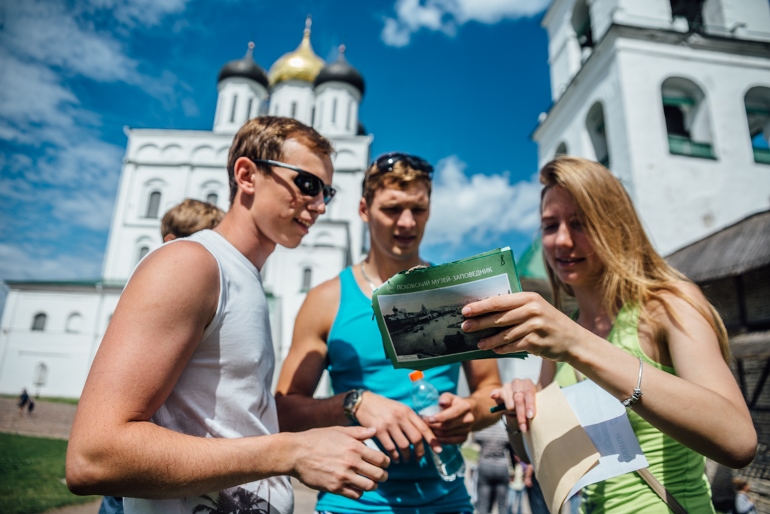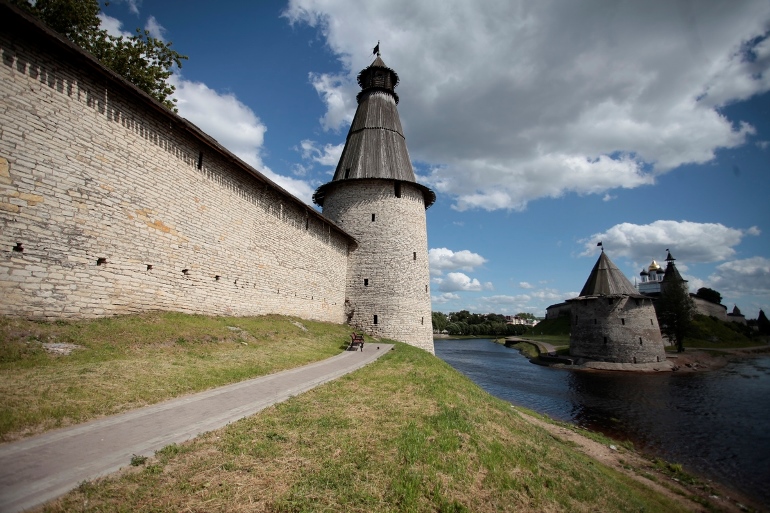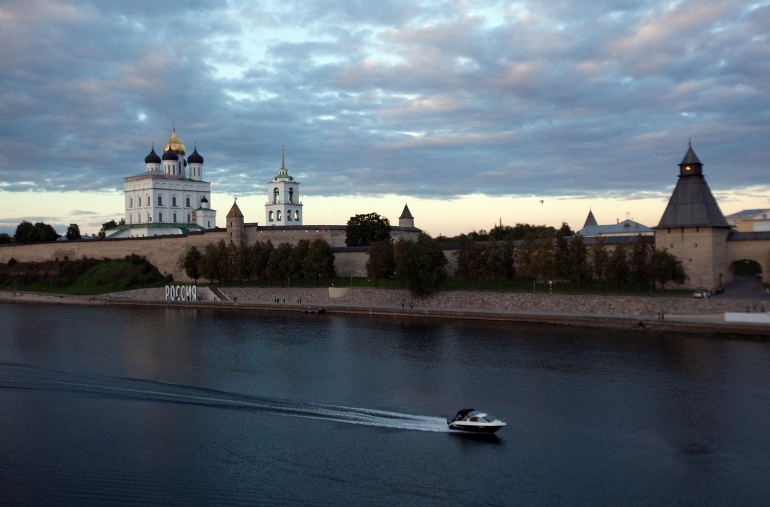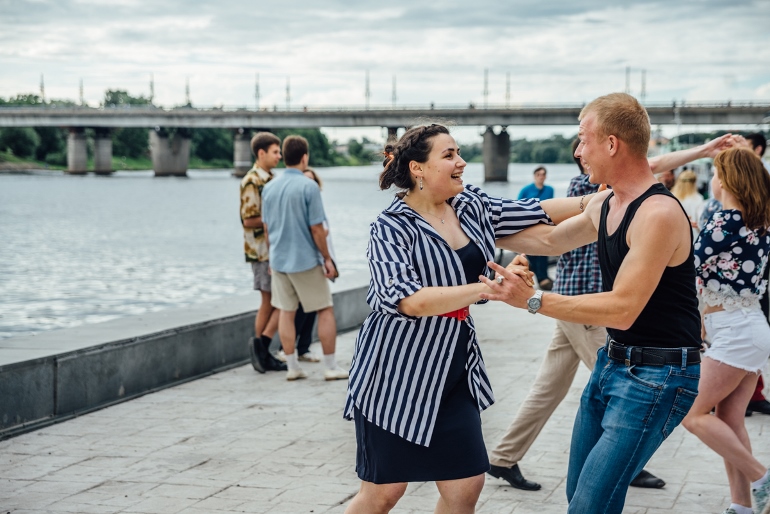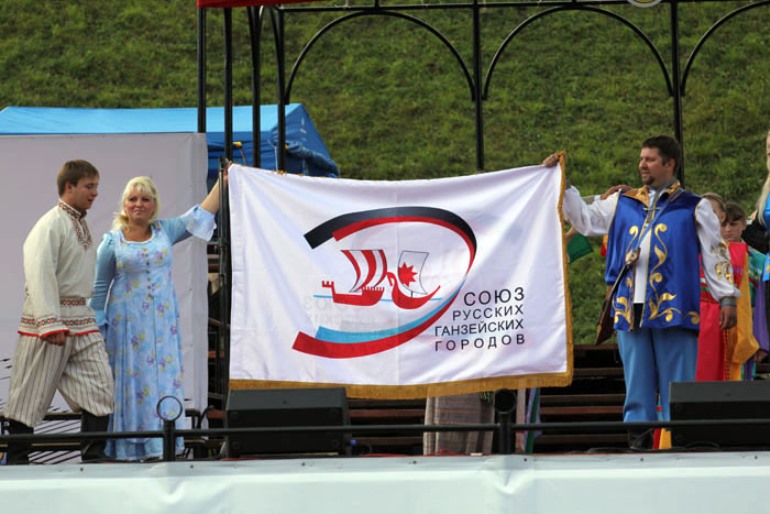Sergey Vinogradov
The International Hanseatic Days were held in Pskov on June 27 - 30. More than 1,700 delegates from 86 cities of the Hanseatic Trade League (which includes 192 cities in total with 14 Russian ones among them) have been guests of Russia these summer days. The program includes festivals, concerts, fairs and forums with discussions of economic projects. The Russkiy Mir has inquired how they prepared for the grand event in Pskov and what Russian cities gain from participation in the events of the Hanseatic League of the New Time. History, culture and business. And no politics at all…
Many people think that Hansa is a city in Germany, but it is not. When translated from old German, Hansa means group or league. This word has been used with a capital letter and in different languages since the middle of the 12th century. That was the time when the Hanseatic League was formed with the center in the German city of Lübeck. The League united cities and towns of North-West Europe.
Photo credit: ganzapskov.ru
For 500 years of its existence, the League included from 130 to 160 cities and towns. The aim of the association was the joint development of free trade and the consideration of the economic interests of all parties. Membership in the League helped to achieve trade preferences, enter into large multilateral transactions, fight unscrupulous partners, and even influence world politics.
Russian cities were also part of the Hanseatic League. The regional representative office of the association was located in Novgorod, and the Old Russian language was one of the full-fledged languages of the community.
The League was very strong. Nevertheless it ceased to exist in the 17th century due to various historical events and shifting of economic centers. The Hanseatic League of the New Times (or the “New Hansa”) was founded in 1980, in the year of the 700th anniversary of the union. The descendants adopted the organization’s principles from their ancestors. There is no a single word about politics in the list of postulates which form basis for the New Hansa. Instead separate paragraphs are dedicated to joint trade, freedom of opinion and goods, as well as to dialogue between countries.
And those principles are not violated to please immediate political winds. In 2014, when the anti-Russian trend gained popularity in Europe, the people of Hanseatic League were not afraid to proclaim Pskov the capital of the Hanseatic Days. According to Bernd Zachs, the President of the Hanseatic League and the Mayor of Lübeck, the International Hanseatic Days in Pskov will help “people from different countries to come closer together bringing human relations to the fore”.
Photo credit: ganzapskov.ru
Films and knights
Official representatives of ancient cities of Germany, France, Holland, Sweden, Finland, Iceland, Poland, and the Baltic countries have arrived to Russia. Representatives of Pskov said earlier that the city expected about half a million visitors from abroad and Russian regions. Over the past years, the city with population which barely exceeds 210 thousand people has been solving the problem of accommodation.
The four-day agenda of the Hanseatic Days will cover dozens of sites throughout Pskov and includes dozens of events. Let us mention the most vivid, interesting and important ones.
Opening of the Western Gates, the first international film festival, was scheduled to coincide with the Hanseatic Days in Pskov. Its organizers assert that the festival has a twofold purpose - to introduce new European films to the Russians and help Europe to discover Russian cinematograph. The program includes films from six countries, including Russia. Also a lot of film classics will be shown on the festival screens.
Photo credit: ganzapskov.ru
There will be many concerts, which will gather more than 60 on-stage performance groups from eight countries. Let us mention the International Choral Festival. It will be held both indoors and outdoors and will gather more than a thousand participants. Also, guests of the Hanseatic Days cultural program will hear jazz music, classics, and folklore from different countries.
A common history uniting the residents of the participating cities will be resurrected in the Pskov Finnish Park and on the embankment of the Velikaya River (The Great River) The International Club of Historical Reconstruction will open here. Many European languages, as befits, will be spoken in the deployed medieval camp. Viewers will see reconstructions of battles and may have experience just like a medieval warrior, merchant, craftsman or even a cook.
At the round table and at the market stall
Traditionally opening of the Hanseatic market is one of the central events of the celebration. Actually, the market is the very place where you can meet representatives of different countries with their traditions, costumes, goods and cuisine for real. Delegations of the participating cities open their temporary representation embassies at the Hanseatic market and tell Pskovians and guests about their sights and tourist routes.
There is also a craft fair nearby, where craftsmen from different countries and Russian regions present traditional goods. Some of them can be purchased. The Coming Together Cross-border Economic Forum and the industrialists exhibition will be characterized by serious discussions and economic effects.
And, finally, the delegations marched along the streets of Pskov on June 30 before the closing of the Hanseatic Days.
After the festival is over, there will surely be a dispute on that it leaves for Pskov. One legacy can be mentioned even now – the Hanseatic Days will leave about two hundred Pskov citizens who know the history of the Hansa in detail and have skills to organize major international events. Those are the volunteers who prepared the Pskov City Youth Center for the main and Youth Ganza.
Photo credit: ganzapskov.ru
Elena Zinovyeva, the head of the Center’s media service, told the Russkiy Mir that the volunteer recruitment had generated a real buzz in Pskov. There were applications submitted several times more than the group could accommodate. There came schoolchildren, students, and pensioners. Their training lasted for several months and turned to be a mixture of the historical, foreign languages, pedagogical departments and etiquette classes. Plus, a medical volunteer detachment was formed with medical college students.
“As part of the Hanseatic Days in Pskov, there is a separate program for young delegates between the ages of 14 and 25. It includes fewer official events and more informative ones with immersion into history,” said Elena Zinovyeva. “This is the so-called Youth Hansa, or they are also called Hanseatic rising generation. 83 delegates from ten countries came to us.”
Big Hanza and little Belozersk
What do cities gain from being members of the Hanseatic League? And do the Hanseatic days have practical effects? The Russkiy Mir addressed these questions to the leaders of Belozersk, one of the oldest Hanseatic cities in Russia, that participated in the establishment of the League of Russian Hanseatic cities in 2010.
The oldest city of the Vologda region is located on the shore of the Lake Beloye. It is quite far from highways and does not have a railway. Several years ago, Belozersk celebrated its 1050th anniversary and briefly rode the ground-swell of news. Then the anniversary celebrations abated. Tourists are shown several ancient temples, the famous Belozersky rampart surrounding the Kremlin, and the filming locations of The Red Snowball Tree, a drama film directed by Vasily Shukshin.
Photo credit: pskov.bezformata.com
When the Russkiy Mir reporter called to Elena Kopylova, the head of the culture and tourism department of the Belozersky District, she was busy packing for the Hanseatic Days in Pskov. Belozersk sent a substantial delegation chaired by the head of the district to meet with representatives of the “peer cities.” The best craftsmen of Belozersk also went to Pskov. The delegation got its own minstrel, Alexander Smirnov, who will be singing his songs about the Vologda countryside with a harmonica in his hands.
“The Hanseatic League is a reputable international community, and it helps us develop in several directions,” says Elena Kopylova. “We maintain cultural ties with the cities of the Hansa, use recommendations and advices, participate in joint educational and cultural projects.”
In the old days, the Hansa united merchants from European countries and Russia, and was a community mostly bound by economic interests. Representatives of the Hanseatic cities in Russia note that new Hansa lacks deeper economic cooperation, however small Belozersk still perceives some effects of the Hanseatic conventions, which can be evaluated in numbers and budgetary receipts. According to Elena Kopylova, who is engaged in tourism development in the region, since Belozersk became a member of the Hanseatic movement and it has been mentioned and flashed “across Europe”, foreign tourists — both individual and in groups — visit the city quite frequently. And they mostly come from the countries of the Hanseatic League - Germans, British, Swedes, Poles.
While Russia is discussing and mapping a tourist route through the Hanseatic cities of the country, some travellers have already got directions through their smartphones. This is what New times, new Hansa, new mobility is all about.

